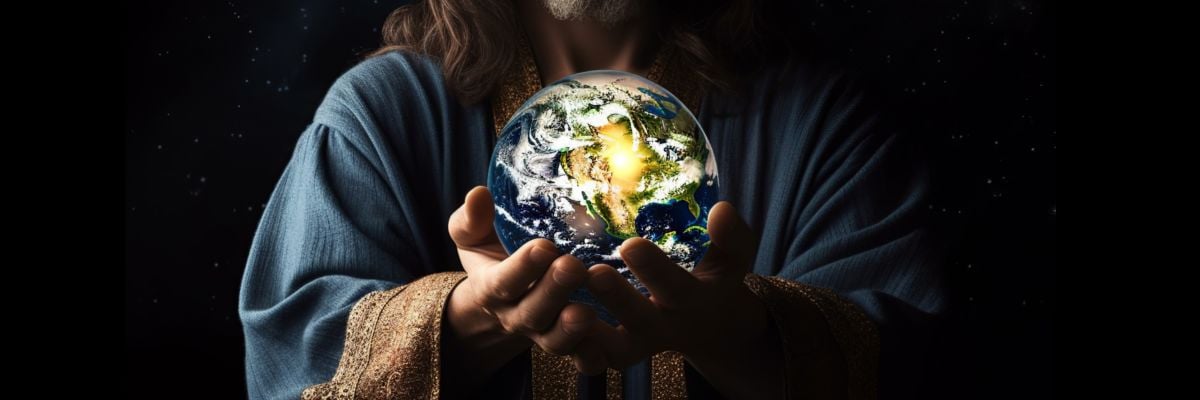
The ritual symbolism at Christmas is breathtaking if you sit with it a moment. In the night we learn of the Lord’s humble birth. We then hear the angelic chorus filling the heavens with song. At the dawn Mass, sometimes called the Shepherds’ Mass, we journey with the shepherds to see “this thing which is come to pass” (Luke 2:15). Here the light begins to break as the news spreads. Now, in the full light of day, we “[behold] his glory, the glory of the only begotten of the Father, full of grace and truth” (John 1:14). “No one,” John says, “has seen God. The only Son, who is in the bosom of the Father, he has made him known” (v. 18).
We have moved from the sudden event, through its surprising grace and wonder, to a more deliberate meditation on its meaning. The other Christmas readings continue the theme, especially that stunning opening verse from Hebrews: “In many and various ways God spoke of old to our fathers by the prophets; but in these last days he has spoken to us by a Son” (1:1-2).
John 1 represents one of the most succinct early Christological statements in the New Testament. It will always oppose those who imagine some kind of corruption between an early prophetic Jesus and a later divine Christ. John could not be more clear. The Word is God. And the Word became flesh.
This passage also serves as a constant testimony against those who want to pit “doctrine” against “practical” or “pastoral” matters. Christ isn’t a mere ideal; he has a real, particular human nature. But the fact that he is flesh and blood doesn’t mean that he ceases to be the divine Word, the Logos, eternal Reason itself. Referencing a line from G.K. Chesterton, Christmas reduced to ideas of truth, purity and love isn’t Christmas. Christmas is material, or it is nothing.
But we can also go in the opposite direction and imagine that the Nativity’s fleshly materiality gives us a pass from thinking hard thoughts about good and evil, life and death.
Notice how the darkness responds, according to John. “The darkness comprehended it not.” Some translations say the darkness has not overcome it. John means both. But let’s linger a bit on comprehension or understanding. What does it mean to say that the darkness has not comprehended the light? Darkness cannot comprehend the light, because darkness is nothing but the absence of light. It is not a thing in itself. If the light here is the divine Logos, the divine rationality, of course the light cannot be understood by the darkness. We could say something like understanding cannot be understood by the absence of understanding. It just is the nature of darkness.
You cannot know what light is without light. We could say in a trite way that you cannot know what Christmas is without Christ, which is true. But I think John wants us to see not just that Christ is the “reason for the season” or something like that, but that he is the reason for, in fact, everything, because he is reason. All things were made by him. All things are made by him. So you can’t expect to really understand any of the things that he has made without him. Indeed, if we do understand anything at all, it is only because we are created in his image, possessing a free, rational soul. We can possess this without knowing its source, but there comes a time of decision when, faced with that source, we either reject it or trust it. We either throw aside the foundation of our own rationality or recognize that the ultimate source of that rationality is not ourselves, but another, a person, even a divine person, who has, at a certain moment in history, revealed himself to us.
The world can appear very dark at times. At times the Church seems dark, too. And the truth and goodness of Christ may seem, at times, to have a lot of competition in the world. But the light does shine in the darkness, and the darkness cannot comprehend it.
Often I think that, to the extent that we perceive Christ to be in competition with the world, we also fail to really understand who he is. Clouds may hide the sun; they may seem to be the largest thing in the world. But they are nothing. The darkness is nothing. God is everything. The babe in the manger is everything. He is the light. Let us go even unto Bethlehem and be blinded by his radiance so that we can see.
“O Day-spring, Brightness of Light everlasting and Sun of Righteousness: come and enlighten him that sitteth in darkness and in the shadow of death.”



